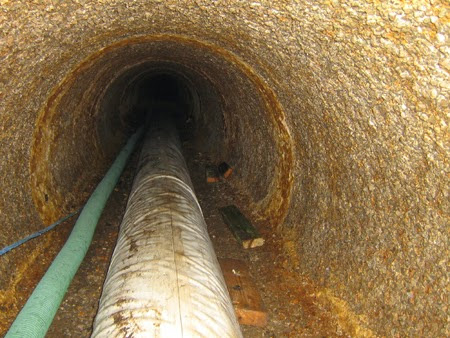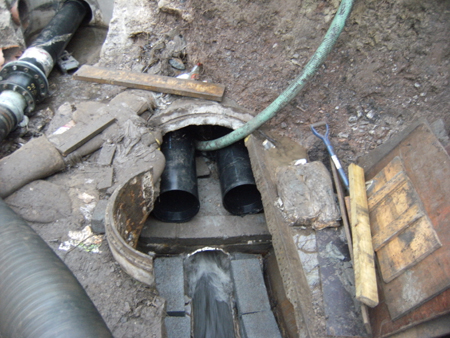Feature Stories
Innovation to Change
MARKETPLACE 5 November 2014

Innovation is about progressive approaches or changes which tackle the big societal and environmental challenges we face. Communities and the businesses within them are full of innovative people, after all it is what sets humanity apart, and innovation takes. In recent years, Wessex Water has been pursuing novel approaches to achieving environmental and social outcomes. These include:
• providing agronomic advice to farmers to protect drinking water sources,
• real-time reporting of sewer flooding incidents near bathing waters,
• a wide range of no-dig methods to refurbish water mains and sewers to reduce disruption and costs, and
• early adoption of enhanced anaerobic digestion of sewage sludge.

Trenchless Technology
As greater innovation is needed to make a number of proposals on better collaboration and economic incentives for outperformance in the water industry, at the same time keep up the Company excellent standards of customer service, the Company encourage their staff to spot potential improvements and bring in ideas from outside. The collaboration with researchers, businesses and other external bodies has helped Wessex Water in this aspect.
Water mains and sewers must be kept in good working order through repairing, refurbishing and replacing the underground assets. Traditional methods are often disruptive, causing road closures that affect local residents and businesses and generating a lot of waste material as ground is dug up to access pipework. Therefore, wherever possible the Company will use trenchless technologies which minimise the need for open-cut excavation by working up and down water pipes and sewers, accessing them via discrete points.
This way the Company can carry out surveys, find exact locations of problems or weak points, clean out pipes or refurbish them from inside – whilst keeping waste and disruption down. These innovative techniques are a central park of their work and include:

• renewing water service pipes using a ‘mole’, where the Company burrow under the ground so they don’t need to excavate
• modernizing water mains and sealing cracks in their walls by using polyurethane liners
• ice-pigging – cleaning water mains by forcing ice sludge through with water
• using a pressurized device known as a ‘ferret head’ to pinpoint the location of leaks, resulting in faster repairs
• repairing the walls of sewers by inserting a polyester liner through a manhole which is set in place with boiling water
• sealing sewers with a sticky resin which stops water from seeping in, reducing infiltration that can cause sewer flooding
• pipe bursting to deal with deformed sections – metal bars are fed from manhole to manhole, allowing the staff to smash old pipes and pull through a strong of new plastic pipes. The Company use this for 70% of their mains replacement programme
• auger boring and directional drilling where pipes are drilled under rivers, railway lines and main roads, helping to avoid disruption
• using mobile robots to detect damage and blockages in sewers, and even inspect and clean the inside of service reservoirs.
Taking as an example, in order to ensure the water pipes and sewers has been installed correctly, a robot with CCTV equipment is put into the sewer to survey the work. By using a CCTV robot, the Company managed to repair a section of an ageing sewer at risk of collapse. Rather than digging up the motorways, the repairs on the section of sewer running from Banwell in Somerset to the motorway were conducted and completed by pushing a plastic sock inside and illuminating the interior with a UV light. Trenchless technology not only speeds up the process, but it also helps the Company to reduce costs and disruption. Repairing the sewer in this way is also more environmentally friendly as less fuel is used in the process.
By employing the “no dig” technologies to repair pipelines and sewers, Wessex Water can avoid 116,000 tonnes of waste material in one year, and achieve a 90% carbon dioxide (CO2) emissions reduction compared with open cut methods. Wessex Water will continue to trial new forms of trenchless technology that can help further improve the efficiency of water mains and sewer maintenance works.
Find out more:
http://www.wessexwater.co.uk/about/threecol.aspx?id=5376
http://www.waterprojectsonline.com/case_studies/2013-Virtual/Wessex_M5_Sewer_2013_VE.pdf
For other techniques, please view:
http://www.youtube.com/watch?v=47yFvw0lJyw
http://www.youtube.com/watch?v=6_MLZAWpDE8



